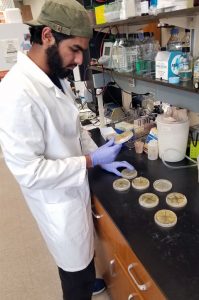Chemical Engineering

Who is your mentor for your research project?
My mentor is Kartikeya Joshi under the supervision of Philip Farabaugh, Department of Biological Sciences. Kartikeya Joshi was a grad TA in BIOL300L when I took it. After taking that lab, I became extremely interested in research and started asking different professors as well as friends who were working in labs. One of my friends was working under Kartikeya Joshi’s mentorship. After he graduated, he referred me to this lab. I also sent a formal request along with my resume, requesting Mr. Joshi and Dr. Farabaugh to allow me to give me the opportunity to work in the lab. After an interview I was accepted. I chose my mentor because I had already experienced his mentorship in BIOL300L as mentioned above. I was very impressed and wanted to learn more from him.
How did you become interested in this project?
The processes that we are researching in this project are very important for the healthy development of human cells. Although mostly overlooked or taken for granted, the process of Translation is essential for the proper functioning of every system, organ and even every cell in our body. The idea that I can research and report something new about this vital process was very appealing to me. Additionally, I had studied about this process for many years in different courses. Being able to practically observe it and study it up close was really like a dream come true.
What has been the hardest part about your research/what was the most unexpected thing about being a researcher?
The most unexpected thing about my research was the uncertainty of results. Research is dynamic process. While one method may work for researching one process in one organism, it may not work the same way for another process in another organism. The frequent application of “trial and error” is something that was quite unexpected.
What has been the most rewarding part?
There is an infinite amount of scientific knowledge available to us. The realization that my research was providing new knowledge, new facts and new insights into cellular processes that have never been known before has been most rewarding.
How will you disseminate your research?
I have presented my research at Undergraduate Research and Creative Achievement Day (URCAD), Summer Undergraduate Research Fest (SURF) and Undergraduate Research Symposium. We are trying to publish a paper next year reporting the research as well.
What is your advice to other students about getting involved in research?
I would advise students to get involved as early as possible, learn from your mistakes and never give up. Research is a long process that requires an amazing amount of patience and perseverance. But the results are just as rewarding, if not more.
What are your career goals?
I hope to go to medical school and study Ophthalmology. I intend to practice as well as get involved with clinical research.
12/13/17